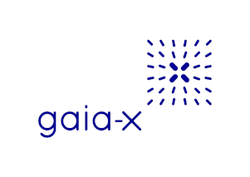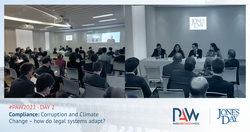The recent news
March 31, 2022
Conferences

 ► Référence complète : Frison-Roche, M.A., Ex-Ante Compliance, in Gaia-X, Towards Automated Compliance in the Data Economy, 31 mars 2022.
► Référence complète : Frison-Roche, M.A., Ex-Ante Compliance, in Gaia-X, Towards Automated Compliance in the Data Economy, 31 mars 2022.
_____
► Voir le programme (en anglais)
____
► Présentation générale de l'intervention : (en anglais)
This intervention before the Board of Gaia-X is built on four observations about the evolution of the European legal system, showing how it is in favor of Gaia-X, articulated with an article on Ex Compliance Law and Labelling mechanisms, co-written with Martine Gourié and Hubert Tardieu.
The principal idea of this speech is to show that if Competition Law and Compliance Law are two different branches of Law, they are articulated. More now than before, and certainly they will be increasingly articulated.
As I shall show it, the European Institutions develop both as two pillars, notably through the Digital Markets Act (DMA) for Competition Law and the Digital Services Act (DSA) for Compliance Law.
The European Union does not have to choose between Compliance and Competition: the European space is built on both, for instance Flexibility through the principle of free Competition and Sustainability through the principle of Compliance.
The speech develops 4 remarks.
1. Compliance Law is not appropriation of legal rules by private sector. The first principles are always made by Legislators (European and National public rule makers, in our case) and everything must always be challenged before courts.
2. Competition Authorities want to increase the efficiency of Competition Law, bringing Competition Law to Compliance Law. They always do (see European Commission, Compliance matters, 2013). Moreover, this is the object of the Digital Markets Act, putting Competition Law from Ex Post to Ex Ante concernant the digital space. It is a revolution, but the purpose of Competition Law does not change: Compliance Legal tools are implemented by this so important Act, but it is always free and fair competitive markets. The purpose is to obtain to obtain more efficiency without change the substantial goal.
3. But the European Union is moving to a more substantial Compliance Law, by the Digital Services Act, the twin of the DMA. This more political text wants to impose safety in the digital space and protect users' rights in Ex Ante, by Compliance. This is a Monumental Goals, to obtain a European sovereignty. This political ambition is served by the private sector. It is impossible to apprehend DMA without consider DSA: they are twins. Their articulation will be protected by courts and explained to them.
4. They illustrated a more general European evolution. Two examples: the Trans-Atlantic Data Privacy Transfer Framework, articulating free flow of data and effective protection of individuals, and the proposal of European directive for a Corporate Sustainability Due Diligence, with Compliance Ex Ante mechanisms, public authorities helping and supervising private sector fighting human rights' violations and climate change in the perspective of sustainable economy.
Because at the end of the day, the future of Europe is in common values, protected by courts.
____
Pour aller plus loin⤵️
March 29, 2022
Conferences

 ► Full reference: Frison-Roche, M.A., The part of Compliance Law in the fight against Corruption and Climate Change, in Paris Arbitration Week (PAW), Compliance: Corruption and Climate Change - how legal systems adapt?, Jones Day, March 29, 2022.
► Full reference: Frison-Roche, M.A., The part of Compliance Law in the fight against Corruption and Climate Change, in Paris Arbitration Week (PAW), Compliance: Corruption and Climate Change - how legal systems adapt?, Jones Day, March 29, 2022.
Debate with Mathias Audit coordinated by Claire Pauly, Vice-President of the Paris Arbitration Week.
____
► Presentation of the intervention: After the presentation made by Mathias Audit of the consideration of facts of corruption, notably by the red flags method, in an arbitration trial, it seems a low-performing system of proof in compliance: the more diligent a party is in showing that it tried to meet its compliance obligations, the more it is exposed to demonstrating its own failure to doing so. It seems a perversity … Therefore, I can understand why companies often so dislike Compliance Law because more they make efforts, more they put money and more they are punished…
But this representation is not totally exact.
My first observation is about the definitions themselves. It is particularly important to have a precise definition of “compliance obligations”, to not confuse them with obligations coming from Criminal Law. The confusion between Criminal Law and Compliance Law is frequent, maybe because what Compliance Law want to eradicate is also prohibited by Criminal Law, for instance corruption. Indeed, technically criminal legal rules and compliance legal rules have many points of contacts, but they are not the same: the obligations are different, the legal persons obliged are different, the reasoning are different the purposes are different.
Because the general definition of Criminal Law and Compliance Law are different. Criminal Law, very old branch of Law, which prohibits and sanctions corruption, does it for everyone because the singular behavior is wrong (to corrupt; to be corrupted). Compliance Law is a very new branch of Law, is a systemic branch of economic Law, which wants to eradicate in the future mechanisms because they destroy economic systems, such as corruption does. Its wants that not to protect moral values but to protect economic systems. Therefore, Compliance Law asks some entities, large companies, to do something only because they are in position to do so: to detect and to prevent this corruption, in order to obtain in the future, the protection against this systemic risk threating the economic systems. The compliance legal tools are more in Ex Ante than in Ex Post: risk mapping, audit, code of conduct, training, obtention of information through the chains of suppliers.
The proof to give is not the non-corruption everywhere from everyone but this concrete action of prevention and education, companies being entities helping public authorities in this global fight.
More precisely, in this definition Compliance Law is not the general obligation to obey the regulations applicable (because this is simply the definition of Law itself, applicable to everybody). Compliance Law is a very new branch of Law which exists only for some systemic “global policies” (as the title of your manifestation says) applicable only on systemic entities (large companies) in a global perspective: for instance, fighting corruption, fighting money laundering, fighting climate change, fighting discrimination between human beings.
In your example, for fighting corruption, specific legal obligations are taken, such as FCPA (with extraterritorial effects) or in French legal system the so-called the 2016 “Sapin 2” Law. These obligations don’t concern everybody: they concern entities in position to do so: large companies.
My second remark is about the burden of proof. These compliance obligation or compliance duties are obligations of means. Companies are obliged to adopt Compliance plans, organize risk mapping, and so on. A lot of them organize them through code of compliance, or code of ethic, or code of corporate social responsibility, because Compliance Law is in an intimacy with Corporate Law. Because Compliance Law is a very concrete branch of law, these disposals are adopted at the level of the group and replicated in the contracts with suppliers.
But he success of these compliance tools is only an obligation of means. For instance the supervisory authority does not require the company to have seen all the risks, in their existence or their exact quantification. In this sense, about money laundering, the French Financial Markets Authority said that the setup of these compliance tools must be “effective”, but after that the company must only do its “best efforts” to aim an “efficient” result (obligation de moyens). The French Regulatory Authority for the digital space says the same about the eradication of speeches of hate that Compliance Law oblige digital companies to fight (using the term of obligation de moyens).
Moreover, about corruption, the Commission of sanction of the French Anticorruption Agency said in a decision of July 2019 that the firm is free to choose the technics to detect and to prevent the corruption (confirming that Compliance is not just following what the Regulator says), but offered a legal certainty: if the company just follows what the Regulators had said in its guideline (rule based compliance behavior), it is no more possible to punish it.
My third remarks could be a proposal for a more efficient system of proof. It is true that the burden of proof is on the company’s shoulders. But the object of proof is not the absence of corruption (it would not be possible…). The object of proof is the existence of due diligence to detect and prevent corruption.
Companies must prepare that, must constitute these proofs by advance. “Due diligence” is a legal concept frequently used in Compliance Law. Regulators, supervisors, and courts ask companies to show the reality of these diligences. It would not be sufficient to present the cost of Compliance… It will be sufficient to show the effectivity of Compliance programs freely adopted, taking in consideration the guidelines released by public authorities.
Public authorities say they want to help companies to diffuse an effective “culture of compliance” : a dialogue with civil and corporate courts, not only with criminal courts would be efficient, for instance for the protection of human rights.
In a second part of this debate, on Climate change and Compliance, Claire Pauly asked the question: "My question is two-fold: do you consider that climate change issues should be treated in the same way as corruption issues? And do you think that arbitrators are well suited to tackle those issues, by upholding the method applied to determine and demonstrate corruption issues?".
The response has been:
Firstly, on the technical similarity between fighting Corruption and fighting Climate Change in Compliance Law, it is the same perspective effectively.
If we come back to the definition of Compliance Law, the Compliance tools are organized to obtain in the future systemics results, such as no more corruption, no more money laundering, what we can name “Monumental goals”. This is a political decision: to design the future for excluding some systemic catastrophes. Corruption is an example of systemic risk; but climate change is another one.
Fighting against Climate Change is a Monumental Goal, of the same nature than fighting Corruption.
As everyone knows, we suffer of a lack of tools to address one of this fundamental challenge of our times which is climate change (more difficult than corruption...). But we are lucky to have some Compliance legal tools: we need to use them, because we have so few techniques about this Climate issue…
And Compliance Law is the more adequate branch of Law because it is an Ex-Ante branch of Law : generally, its obligations are on the future, and the Climate change drama is in the future also.
We can already see that Compliance Law is applicable to Climate Change issue
It is easy to see it through the legal techniques.
In the French legal system, the Sapin 2 law invented in 2016 some new compliance techniques, such as risk mapping, audit, due diligence, to detect and prevent corruption.
One year after, in 2017, the so-called Loi Vigilance took the same techniques, copying exactly the legal dispositions of Sapin 2 in this law to oblige large companies to detect and to prevent violation of human rights and environmental obligation, not only inside the corporate group but also through the supply chains. The manager will be accountable for that.
On February 23, 2022, the European Commission adopted a proposal for a European Directive in the same direction of a “global policy” to impose a “corporate sustainability due diligence” on large companies, notably for fighting climate change. This new text will be effective in two years in the Internal legal systems.
By a rules-based analysis and a principle-based analysis, we can see this is the same reasoning.
Of course, this “corporate sustainability due diligence” is only an obligation of means.
But it is extremely ambitious, linked to the direct consideration of the Corporate Social Responsibility.
And I guess it will be efficient because all these tools are not only Ex Post but also Ex Ante: when the issue is to exclude the catastrophic perspective of the disappearance of the humankind on our planet, having Compliance Law, this Ex-Ante branch of law, is so precious!
Secondly, about the role of Arbitration in this issue, I am tempted to say: everyone is required in this global crucial policy!
It is quite difficult for a national court to decide on this sort of issue because Climate change is a global issue, while arbitrators are global judges.
Technically it is necessary and technically possible that Arbitration takes its place, because these due diligences about detection, prevention, action for a better Climate balance are organized non only in corporate mechanisms, such as code of conduct, corporate commitments, or manager remuneration calculation, but also a lot of contractual dispositions.
We will see a lot of new legal techniques: a lot of international public global policies will be adopted. The obligation to give information about that not only to investor but also to stakeholders will be adopted worldwide. The technique of “compliance by design” will be used on the corporate policy of fighting against Climate change.
Meanwhile, the classical branch of law, were Compliance Law steps in, will remain active, such as International Law, Corporate Law, Tort Law Contract Law, where Arbitration is so central.
So, in short, your question was: are Arbitrators able to deal with climate change issue? my response is: “oh, yes!”
____
► Read the repport made by the fait par la Paris Week of Arbitration ( on the distinction between Compliance Law and Criminal Law, and their articulation)
____
Pour aller plus loin⤵️
📘Frison-Roche, M.-A. (ed), Compliance Monumental Goals, 2022.
📘Frison-Roche, M.-A. (ed), Compliance Jurisdictionalisation, 2022.
________
March 24, 2022
Interviews

► Full Reference: Frison-Roche, M.A.,, "Faire du Droit pour qu'à l'avenir le monde soit moins injuste" - à propos du projet de directive européenne sur le devoir de vigilance ("Making Compliance Law for a world less unfair in the future" - about the draft European directive on the corporate sustainability due diligence), interview with Olivia Dufour, Actu-Juridique, March 24, 2022.
____
💬 read the interview (in French)
___
► Interview English Summary: This interview comments on the draft directive presented by the European Commission aimed at unifying European Union Law about Corporate Sustainability Due diligence in global supply chains to protect environnement and human rights effectively, putting companies under same legal rules. including non-European companies.
The interview emphasizes that this text and reinforces Compliance Law perspective in that the legal instruments are Ex Ante, aim at the functioning of groups, constitute incentives, and seek effectiveness to prevent violations of human rights and the environment, 80% of which taking place outside the European Union.
The goal is both ethical, for example to fight against child labor and the endangerment of people, and systemic: the promoting of a sustainable economy, through the help of companies which have some power in value chains which are global.
This future directive clearly shows the difference between simple "conformity" (just obeying all applicable regulations...) and "compliance", illustrated here: aiming to achieve "monumental goals", here fighting against attacks on the climate balance and protect people, to obtain in the future these damages do not occur or are reduced.
________
March 23, 2022
Publications

► Full Reference: M.-A. Frison-Roche & J.-Ch. Roda, Droit de la concurrence (Competition Law), 2nd ed., Paris, Dalloz, "Précis" Serie, 2022, 842 p.
____
► This second edition follows on from the first, written with Marie-Stéphane Payet.
📝read the foreword written in dedication to Marie-Stéphane (in French)
____
📕read the 4th cover of the book (in French)
____
► English Summary of the book: Even if reforms follow one another and upheavals are incessant, whether de facto (digital) or political (apprehension of foreign investment, controversies over objectives), the framework of Competition Law is stable, with French Law and European Law in harmony. Competition Law combines both the Law of competitive markets and the Law of relations between economic players. Its age and homogeneity increase its capacity to find solutions. This book restores the coherence and strength of Competition Law, which, once clarified, is easier to master and anticipate.
The first part therefore sets out the blocks of rules that "protect competitive markets", through mechanisms that are increasingly ex ante, not only merger control but also the control of buyer power, leading to the governance of markets by authorities working together, while sanctions for anti-competitive behaviour restore markets that have been damaged by abuse.
The second part sets out the blocks of rules that "rebalance economic relations". The tools used are often older, but their handling is no less innovative.
____
📕read the table of contents of the book (in French)
____
📝read the review of the book made by the Professor Walid Chaiehloudj in the Concurrences review
________
March 17, 2022
Conferences

► Référence complète : Frison-Roche, M.-A., L’appréhension du risque climatique par les acteurs privés : les apports du droit de la compliance, in Marta Torre-Schaub M., Lormeteau, B. et Stevignon, A.(dir.), Les risques climatiques à l’épreuve du droit Comment le droit fait-il face aux nouveaux risques engendrés par la crise climatique ? , Université Panthéon-Sorbonne (Paris I), Amphithéâtre Liard, 17 mars 2022.
acteurs privés : les apports du droit de la compliance, in Marta Torre-Schaub M., Lormeteau, B. et Stevignon, A.(dir.), Les risques climatiques à l’épreuve du droit Comment le droit fait-il face aux nouveaux risques engendrés par la crise climatique ? , Université Panthéon-Sorbonne (Paris I), Amphithéâtre Liard, 17 mars 2022.
____
► Consulter le programme général de la manifestation
____
► lire le Document de travail ayant servi de base à cette conférence : Prévention et gestion du risque climatique par le Droit de la Compliance
____
► Résumé de l'intervention : Cette intervention a été placée dans une construction qui la place comme une analyse plus particulière de ce qui serait une "insuffisante appréhension des risques climatiques par le Droit". Peut-être que le juriste estime que le Droit fait toujours une "insuffisante appréhension" de tout, parce qu'il voudrait aussi se saisir de tout, mais ne faut-il pas estimer que le Droit, ici le Droit de la Compliance ne vise pas tout, qu'il est au contraire particulièrement adéquat sur un sujet comme le Climat et qu'en la matière il fait déjà beaucoup ?
Etant acquis qu'une société où le Droit serait tout et dicterait tout ne ferait plus place à la liberté, où les règles ne sont pas là pour nous dire à chaque instant et partout ce que nous devons faire, c'est dans ce souci-là qu'il faut trouver la bonne place que doit avoir le Droit de la Compliance, place qui tient à la définition qu'il faut donner à celui-ci.
Préalable : présentation de ce que doit être le "Droit de la Compliance"
Pour que le principe de liberté demeure il faut que le Droit de la Compliance lui-même exprime des Principes et non pas une masse réglementaire, ce qui étouffe les libertés. Si l'on réduisait le Droit de la Compliance à l'idée étroite de l'efficacité apportée à la masse réglementaire qui nous est applicable, par exemple obéir à la réglementation relative à l'environnement et au Climat, alors nous serions devant un choix dramatique : soit sauver la planète, soit sauver notre liberté. C'est parfois ainsi que l'Avenir nous est présenté.
Mais c'est supposer que le Droit de la Compliance serait défini comme l'accumulation de toutes les réglementations qui nous sont applicables et dont nous devrions montrer par avance et à tous que nous plions devant elles, devant toutes et chacune, aveuglement, le robot étant ainsi notre exemple du bon sujet de Droit de la Compliance. C'est souvent ainsi que ce qu'on appelle alors le "Droit de la Conformité" est défini : nous sommes obligés de nous conformer, et de donner à voir que nous nous conformons, et que nous nous conformons par avance, à toutes les réglementations cumulées et confondues, qui nous concernent. Par exemple celles sur le Climat. Parmi d'autres. Comme les autres. Pas moins mais pas plus. Certes nous ne serions alors pas plus libres que ne le sont les robots, mais la question du Climat pourrait être résolue ...Quelle triste perspective .... L'efficacité de la réglementation aurait donc balayé notre liberté, dont la liberté d'entreprendre n'est qu'un des modes.
L'on voit bien que la question est avant tout une question de définition.
Plutôt que d'aller vers cet "apport catastrophique" que constituerait alors le Droit de la Compliance à la résolution des enjeux climatiques, puisqu'en échange de son efficacité nous devrions rendre nos libertés, allons vers ce qui doit être la définition du Droit de la Compliance et l'apport que ce Droit de la Compliance-là est en train d'opérer au bénéfice du risque climatique. Peut-être d'une façon insuffisante, mais d'une façon déjà considérable.
il apparaît alors que le Climat est un exemple qui va aller grandissant des Buts Monumentaux du Droit de la Compliance (I). Cela justifie l'alliance entre les Autorités politiques et les "acteurs privés" pour que l'avenir se concrétise dans un équilibre systémique, ici l'équilibre climatique (II), justifiant la mise en place de mécanismes juridiques nouveaux par rapport au Droit traditionnel.
____
► Pour aller plus loin :
👩🏫📕Les buts monumentaux de la Compliance, 2022
👩🏫📝 Les Buts Monumentaux, cœur battant du Droit de la Compliance, 2022,
👩🏫🎥 Cas climatique, devoir de vigilance et pouvoirs des juges, 2021
👩🏫🚧 Concevoir les pouvoirs, 2022
👩🏫🚧 La Responsabilité Ex Ante, 2022
👩🏫📓Environnemental Compliance Law, as an Ex Ante Responsability, 2021
👩🏫🎥 Devoir de vigilance des entreprises : vers un Droit de la responsabilité Ex Ante, 2021
________
March 17, 2022
Publications
🌐follow Marie-Anne Frison-Roche on LinkedIn
🌐subscribe to the Newsletter MAFR Regulation, Compliance, Law
____
► Full Reference: M.-A. Frison-Roche, "La responsabilité Ex Ante" ("Ex Ante Responsibility"), in Archives de Philosophie du Droit (APD), La responsabilité, t. 63, Dalloz, 2022, pp. 105-115
____
📝read the article (in French)
____
🚧read the bilingual Working Paper which is the basis of this article, with additional developments, technical references and hyperlinks
____
► English Summary of the article: Today, Law is faced with a strategic imperative: to turn its strength towards the future, to deal with issues (digital and climate) over which law and contract do not have the required influence, because they are too local or too unsystemic, while ex post liability is not adequate to deal with the irreparable. Responsibility therefore takes hold of the future, with the judge becoming the central figure in the world through no fault of his own. This shift in time may continue to be anchored in the past, as a result of commitments made by States or firms. But this responsibility for the future, giving rise to an obligation not to make reparation but to do something about it, may come even more directly from the mere fact that the entity in question is ‘in a position’ to act to ensure that others are protected. Pre-constituted evidence, ex ante office of the judge, duty for others, but also powers of the firm and State to bear this ex ante responsibility, pillar of Compliance Law, Law of the future, are the new rules that are being put in place.
________
March 16, 2022
Teachings : Droit de la régulation bancaire et financière - semestre 2022

 ► Référence complète : Frison-Roche, M.-A., La Régulation internalisée dans les opérateurs bancaires et financiers : le Droit de la Compliance, in Leçons de Droit de la Régulation bancaire et financière, Sciences po (Paris), 16 mars 2022.
► Référence complète : Frison-Roche, M.-A., La Régulation internalisée dans les opérateurs bancaires et financiers : le Droit de la Compliance, in Leçons de Droit de la Régulation bancaire et financière, Sciences po (Paris), 16 mars 2022.
____
► Résumé de la leçon sur le Droit de la Compliance : La Compliance, ne serait-ce que par ce terme même, est un mécanisme nouveau dans les systèmes juridiques européens, venant en convergence du Droit de la concurrence, du Droit financier et du Droit du commerce international. L'on considère généralement qu'il provient du Droit financier et du Droit américain, qui développe ainsi d'une façon extraterritoriale ses conceptions juridico-financières.
Est ainsi en train de naître un Droit de la Compliance.
Il pourrait être celui qui disciplinerait l'économie numérique, laquelle croise étroitement l'économie bancaire et financière, qu'elle renouvelle, comme celui qui apportera des solutions pratiques aux enjeux climatiques en ce qu'il est une branche du Droit Ex Ante et que, contrairement au Droit de la Régulation dont il est pourtant le prolongement, il ne dépend pas de l'existence préalablement établie d'un "secteur".
Pour en mesurer l'importance et le développement, qui ne font que commencer, le plus probant est de commencer par sa dernière manifestation en Droit français, à savoir la promulgation en France le 9 décembre 2016 de la loi dite "Sapin 2", suivant de peu la loi du 21 juin 2016 sur les abus de marché et suivie de peu par la loi du 27 janvier 2017 sur le devoir de vigilance des sociétés mère, source d'inspiration du projet de directive européenne déposée par la Commission européenne en 2022.
____
🔎 Accéder aux slides servant de support à la leçon sur l'émergence du Droit de la Compliance
🔎 Revenir aux bases avec le Dictionnaire bilingue du Droit de la Régulation et de la Compliance
🔎 Approfondir par la Bibliographie générale de Droit de la Régulation bancaire et financière
🔎 Revenir à la présentation générale du cours
🔎 Se reporter au plan général du cours
____
Voir ci-dessous la bibliographie de base et d'approfondissement sur le Droit de la Compliance ⤵️
March 10, 2022
Conferences

► Référence complète : Frison-Roche, M.-A., "Secrets professionnels : spirale d'une importance accrue et d'un affaiblissement fulgurant", participation à la Table-Ronde sur le thème du secret professionnel, in Comité de Liaison des Institutions Ordinales (CLIO), Secret professionnel et indépendance : deux leviers, garants de l’efficacité et de la confiance envers les professions réglementées, 10 mars 2022.
Cette Table-Ronde est animé par Fabrice Lundy, journaliste à Radio-Classique ; y participent également Jean-Luc Sauron, Conseiller d'Etat et Jacques Lucas, Président de l'Agence du Numérique en Santé.
____
►Lire la synthèse écrite du colloque
____
► Revoir la vidéo de la table-ronde
____
► Résumé de l'intervention : Le thème du secret professionnel est appréhendé comme illustration du rôle essentiel joué par les Ordres professionnels dans le monde d'aujourd'hui (le colloque traitant dans un second temps de la question de l'Indépendance).
Avant toute participation active au débat proprement dit, l'intervention a pour utilité de présenter le Secret professionnel en lui-même, puis en quoi le monde actuel apporte des éléments nouveaux au besoin impératifs de celui-ci, dans le même temps qu'il le met particulièrement en difficulté.
I. LA PERMANENCE DES SECRETS PROFESSIONNELS
Le Secret professionnel, comme tout secret, porte sur une information. C'est une information qu'une personne a sur elle-même ou sur une autre, et qui potentiellement peut mettre cette personne en danger, ou la fragilise, ou l'expose, la constituant en situation de faiblesse par rapport à autrui : l'information peut concernant son état de santé, sa filiation, un acte dont un autre pourrait se prévaloir pour la punir plus tard.
Cette information, que la personne garde pour elle ou qu'elle partage avec peu de personnes, elle va la confier à un "professionnel". Pas n'importe quel professionnel : un professionnel en qui elle a confiance, non seulement parce qu'elle croît qu'il est techniquement compétent (un avocat qui connait le Droit, un médecin qui connait la Médecine) mais parce qu'elle croit qu'il va lui aussi garder pour lui cette information sur la faiblesse de son client, malgré le profit qu'il pourrait tirer de la communiquer à d'autres (presse, juge, voisin de table dans un diner, etc.). C'est donc la confiance que la personne en situation de faiblesse a dans le titre même de la personne, parce qu'il est "avocat" ou "médecin" ou "infirmier", etc., qu'il donne cette information, car il sait que parce qu'il est médecin (et pas seulement parce qu'il connait la Médecine), qu'il garde ce secret. Ainsi ce n'est pas le diplôme comme signe de compétence mais le titre comme signe d'appartenance à une profession qui garde les secrets qui est considéré : c'est pourquoi la profession va pouvoir valoriser cette garde des secrets au-delà des frontières par des associations (American Bar Association, par exemple), si elle peut crédibiliser cela (Ordre et secret sont intimes).
Le rapport que le professionnel, nouveau titulaire de l'information, a avec celle-ci découle de cela. Le professionnel est le "gardien" de l'information. Il n'en dispose pas : la personne concernée lui a confié non pas tant l'information que "la garde de l'information". Il exerce donc sur ce secret, c'est-à-dire le fait de ne pas révéler à autrui l'information, un pouvoir📎!footnote-2494. C'est pourquoi par exemple tandis que la personne concernée peut donner l'information à autrui, la presse par exemple, le professionnel, auquel elle s'était confiée, ne le peut pas. Dans la perspective du secret professionnel, dans la notion de "pouvoir", c'est la notion de "charge" qu'il faut voir, une "charge au bénéfice d'autrui"📎!footnote-2494.
Cette conception juridique est stable depuis que les professions, notamment les professions libérales, existent : ce n'est pas par les compétences techniques, ni même par le lien personnel, que le secret professionnel se noue : c'est par l'appartenance à une profession : c'est donc par l'organisation même de cette profession et la crédibilité de celle-ci, le contrôle à l'entrée de qui y entre et doit en sortir en cas de manquement, l'effectivité, l'efficacité et l'efficience de la discipline.
Tout cela n'est pas remis en cause. Au contraire, plus l'Etat a des difficultés en raison de la disparition des frontières et plus cette structure devient en pratique pertinente.
____
Mais le choc vient d'ailleurs. Il faut du fait que précisément si les secrets que nous avons tous en nous et que nous voulons tous donner à garder n'ont pas changé, en revanche le monde dans lequel nous vivons a changé : ce monde est devenu numérique.
II. LE CHOC DU NUMERIQUE SUR LES SECRETS PROFESSIONNELS ET L'URGENCE DE LES ACCROITRE
Or, par cette transformation totale du monde dans lequel nous vivons les secrets n'existent plus, les secrets professionnels pas moins mais pas plus que les autres.
Il faut mais il suffit qu'une "fuite" apparaisse dans l'espace digital et l'information est disponible à la fois partout et en un instant : la viralité est la loi naturelle de l'espace numérique qui recouvre le monde.
L'on peut s'en réjouir, parce que l'information est un bien commun, que nous sommes dans un marché de l'information, une économie de l'information, une société de l'information, une civilisation de l'information.
Si l'on est plus mesuré, l'on dira que certaines informations doivent être gardées par ceux qu'elles concernent et dans le cercle choisi des personnes qui ont leur confiance : c'est l'invention européenne des "données à caractère personnel", qui recoupent largement les secrets professionnels.
Pour l'instant, le Droit tâtonne tant la situation est nouvelle ...
Tout d'abord, le Droit est dans une sorte d'adoration de l'information disponible sur tout, partout et pour tous... Il y développe des principes comme le "droit à l'information" (sans contrepartie financière), le "droit d'alerte" (vite confondu avec le droit de divulguer publiquement, qui n'existe pas ab initio n'apparaissant qu'en cas d'échec du mécanisme d'alerte, le "droit à la transparence" (qui méconnait l'idée même de droits de la défense) qui vont aller de plus en plus contre les secrets, même professionnels.
Ensuite et surtout, la technologie numérique, qui a structuré l'espace numérique fait qu'une information à l'instant où elle est mise dans cet espace est diffusée immédiatement, partout et demeure disponible pour toujours.
Dès lors, l'on peut toujours continuer à affirmer le principe des secrets professionnels, ceux-ci n'ont plus d'effectivité.
Or, et c'est lors le paradoxe, l'espace numérique non seulement n'a pas diminué la fragilité des personnes, fragilité compensée par la confiance dans la garde des secrets conservés par les professionnels ; au contraire le numérique a accru cette fragilité.
Les revenge porn ou les meurtres en direct en sont un exemple : la personne est encore plus fragile dans l'espace numérique. Les "discours de haine" sont un enjeu majeur, non seulement pour la personne qui en est la victime mais pour le système lui-même puisque, comme le démontre Thimothy Snyder c'est aujourd'hui le système démocratique qui peut chuter.
La "désinformation" peut partir d'une violation d'un secret professionnel, car il peut s'agir d'une information exacte exploitée à des fins nocives, constituant alors une infox, le conspirationnisme étant un phénomène lié au numérique.
Que peut faire le Droit ?
Il peut aller dans deux directions :
Tout d'abord armer davantage les structures classiques : Ordres professionnels, police, Autorités de poursuites et Juridictions.
Ensuite, internaliser dans les opérateurs numériques cruciaux, notamment les plateformes, le devoir de bloquer en Ex Ante la diffusion des informations qui doivent demeurer secrètes (données à caractère personnel, et secrets) : c'est le "Droit de la Compliance".
L'exercice de ce devoir par les entreprises numériques cruciales est lui-même supervisé par des autorités publiques : en France, la CNIL et l'Arcom.
De nouveaux textes sont en cours d'adoption pour obliger les entreprises cruciaux de veiller à ce que les secrets ont préservés. C'est l'un des enjeux du Digital Services Act, Réglement de l'Union européenne en cours de discussion.
L'avenir est certainement dans un rapprochement entre les structures classiques, notamment les ordres et ses Autorités publiques de supervision.
Le Droit de la Compliance, nouvelle branche du Droit Ex Ante qui concrétise la garde des secrets peut être une solution dans cette situation à la fois très nouvelle et très préoccupante.
____
► aller à la présentation d'une précédente participation au colloque annuel du CLIO : La déontologie professionnelle dans un monde ouvert et concurrentiel
► voir la publication qui s'en suivit.
___
► pour aller plus loin :
👩🏫Frison-Roche, M.-A., 📝Les droits subjectifs, outils premiers et naturels du Droit de la Compliance, in Frison-Roche, M.-A., 📕Les outils de la Compliance, 2021
👩🏫Frison-Roche, M.-A.,💬 "Et si le secret de l'avocat était l'allié de la lutte contre le blanchiment ?", 2020
👩🏫Frison-Roche, M.-A., 📕Avocats et Ordres au 21ième siècle, 2017
👩🏫Frison-Roche, M.-A., 📕Secrets professionnels, 1999
👩🏫Frison-Roche, M.-A., 📝Déontologie et discipline des professions libérales, 1998
________